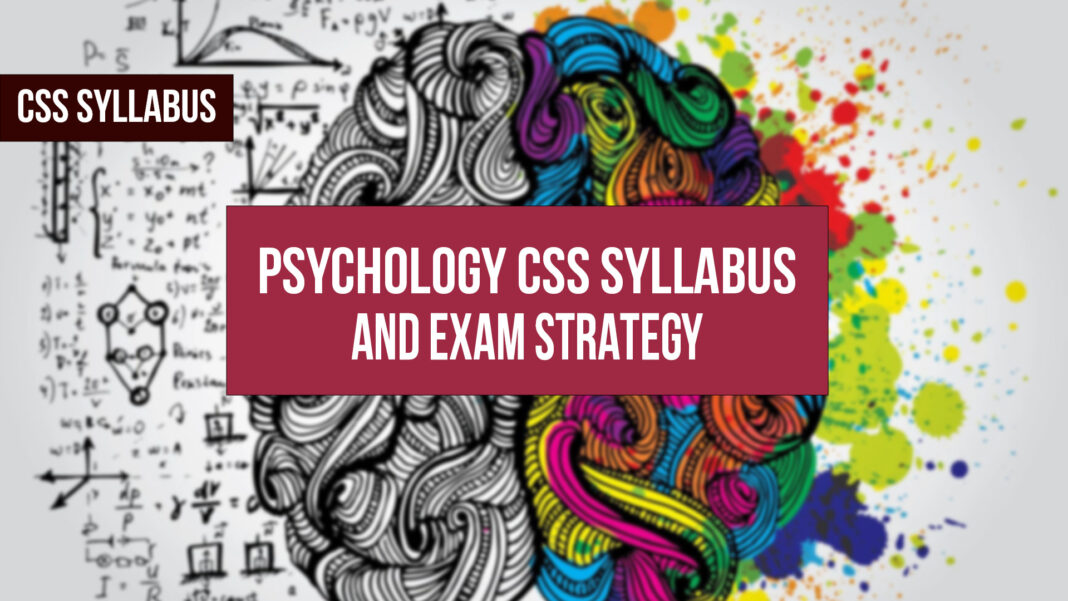Choosing psychology as an optional subject in the Central Superior Services (CSS) exam in Pakistan opens the door to understanding the intricacies of human behavior, cognition, and emotions. The psychology syllabus for CSS is a comprehensive journey through various branches of the discipline, offering candidates the opportunity to delve into the depths of the human mind and its complexities.

CSS Psychology Syllabus: A Brief Overview
The CSS psychology syllabus is designed to provide a well-rounded understanding of the field. It covers diverse topics, including:
PSYCHOLOGY (100 MARKS)
I. Nature and Scope of Psychology: Definition and scope, Psychology as a Science,
Schools, Perspectives, and Models of Psychology, Recent Trends
II. Biological Basis of Behaviour: Nervous System, Neuron and its function, Central
and Peripheral Nervous System, Endocrine System
III. Sensation and Perception: Sensory process, Perception, Gestalt Principles,
Binocular and Monocular cues, Illusions and Extra Sensory Perception,
Determinants of Perception
IV. Learning and Memory: Nature and Forms of Learning, Types of learning: Classical
and Operant Conditioning, Reinforcement, Extinction, Discrimination, Punishment,
Observational Learning, Theories of Learning, Types of Memory, Process of
Memory, Forgetting, Theories of Memory
V. Motivation and Emotion: Homeostasis, Factors affecting Motivation, Biogenic and
Social Motives, Measurement of Human Motivation, Theories of Motivation,
Emotions, Types of Emotions, Physiological changes in Emotion, Theories of
Emotions.
VI. Psychological Assessment: Attributes of Psychological Measures, Validity,
Reliability, Item Analysis, Norms, Modern Test Theory, Selection and Training,
Educational and Clinical Assessment, Ethical and Legal Issues in Assessment.
VII. Personality: Determinants of Personality, Factors in Development of Personality,
Theoretical Perspectives, Personality Assessment and Techniques, Cross-Cultural
Issues.
VIII. Intelligence: Theories of Intelligence, Types of intelligence (IQ, EQ), Assessing
Intelligence
IX. Social Influence and Group Dynamics: Social Facilitation, Attribution, Conformity,
Obedience, Altruism, Attitudes, Social Norms.
X. Developmental Psychology: Physical, Cognitive, Social and Emotional
development in Childhood, Adolescence, Adulthood and Old Age
XI. Abnormal and Clinical Psychology: Concept and causes of Abnormality, Clinical
Assessment and Intervention, Different disorders such as Schizophrenia, Mood
disorder, Anxiety disorder, Personality disorder, etc. Psychological treatment
including different Therapeutic instructions.
XII. Organizational/Industrial Psychology: Leadership styles, Decision making, Work
motivation, Organizational Culture, Stress and Conflict at Work and its Management,
Organizational Socialization, Job related Attitude, Sexual Harassment, Glass Ceiling,
Human Computer interaction.
XIII. Health Psychology: Beliefs and Behaviour, Models of Health Psychology,
Assessment and Intervention, Models of Stress, Chronic and Terminal Illness, Role
of Social Support.
XIV. Forensic Psychology: Psychology and Law, Investigation, Confession, Eyewitness
Testimony, Working with Offenders, Juvenile Delinquents, Drug Addicts, Sex
Offenders etc
Pros and Cons of choosing psychology in CSS
Choosing psychology as an option in the Central Superior Services (CSS) exam in Pakistan has its own set of advantages and disadvantages. Here are the pros and cons:
Pros:
- Relevance to Society: Psychology is a field that directly addresses and explores human behavior, cognition, and emotions. Understanding these aspects can be beneficial for individuals in various roles within the civil services, as it provides insights into human motivation and decision-making.
- Versatility: The knowledge gained in psychology is versatile and can be applied in various domains, including administration, law enforcement, policymaking, and social development. This versatility can be an asset when dealing with diverse challenges in public service.
- Interpersonal Skills: Psychology equips individuals with strong interpersonal skills, which are crucial in civil services. The ability to understand, communicate, and empathize with people from different backgrounds can be advantageous in roles that require effective interaction with the public.
- Problem-Solving Skills: Psychology fosters critical thinking and problem-solving skills. Civil servants often encounter complex issues, and a background in psychology can provide a unique perspective on addressing challenges related to public welfare and governance.
- Research Skills: Psychology involves research methodologies, data analysis, and evidence-based decision-making. These skills can be valuable for CSS officers in conducting surveys, analyzing social trends, and formulating policies based on empirical evidence.
Cons:
- Perceived Utility: Some may argue that psychology may not be directly related to administrative and bureaucratic functions. This perception might affect how the knowledge gained in psychology is perceived and utilized in a government context.
- Limited Job-Specific Knowledge: Unlike some other optional subjects in the CSS exam, psychology may not provide specific job-related knowledge. This could be a disadvantage when compared to subjects that offer more specialized insights directly relevant to administrative tasks.
- Competitive Nature of Exam: The CSS exam is highly competitive, and candidates often choose subjects that they believe will give them a competitive edge. Psychology may not be as popular as some other options, potentially affecting the perceived competition and preparation resources available.
- Application of Knowledge: While psychology provides a deep understanding of human behavior, its direct application in bureaucratic roles may be limited. This could result in candidates with more job-specific knowledge having an advantage in certain tasks and responsibilities.
- Subjective Nature of Evaluation: Essays and subjective questions in the CSS exam may be open to interpretation. Psychology, being a field that deals with diverse perspectives, may lead to subjective evaluations that can be challenging for some candidates.
In conclusion, choosing psychology as an optional subject in the CSS exam in Pakistan comes with both advantages and disadvantages. It is important for candidates to consider their interests, career goals, and the specific requirements of the civil services when making this decision.

Editor Timesglo
Editor can be reached at editortimesglo@gmail.com






